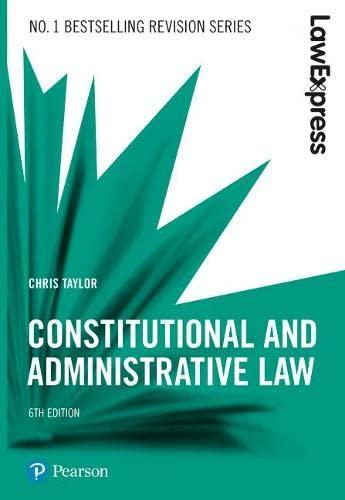Question
Kindly answer all. ____ 6. Uniform laws apply in all states, including those in which the laws have not been adopted. ____ 7. Administrative law
Kindly answer all.
____ 6. Uniform laws apply in all states, including those in which the laws have not been adopted.
____ 7. Administrative law consists of the rules, orders, and decisions of administrative agencies.
____ 8. Congress creates an administrative agency by enacting enabling legislation.
____ 9. In order to truly understand our legal system, it is important to understand the origins of the common law tradition.
____ 10. Common law is the same as statutory law.
____ 11. A court may depart from a precedent if the precedent is no longer valid.
____ 12. Stare decisis is a doctrine obligating judges to help persons who have failed to protect their own rights.
____ 13. Stare decisis is a doctrine obligating judges to follow the precedents established within their jurisdictions.
____ 14. Damages are a remedy at law.
____ 15. Damages are never paid in money.
____ 16. Equity is a branch of law, founded in justice and fair dealing, which seeks to supply a remedy when no adequate remedy at law is available.
____ 17. Criminal acts are prohibited only by federal government statutes.
____ 18. Government authorities cannot enforce national law.
____ 19. Article I, Section 8, of the U.S. Constitution permits Congress to regulate interstate commerce.
____ 20. Preemption occurs when Congress chooses to act exclusively in a concurrent area and a valid federal statue or regulation takes precedence over a conflicting state or local law.
____ 21. The Second Amendment to the U.S. Constitution reserves all powers not delegated to the national government to the states.
____ 22. The Fifth Amendment prohibits unreasonable searches and seizures of persons or property.
____ 23. The Eighth Amendment prohibits excessive bail and fines, as well as cruel and unusual punishment.
____ 24. Symbolic speech is defined as nonverbal expressions of belief and is protected by the First Amendment.
____ 25. The First Amendment protects corporate political speech.
____ 26. A restriction on commercial speech is valid as long as it forbids only the expression of views on controversial issues.
____ 27. The First Amendment protects defamatory speech.
____ 28. The Children's Internet Protection Act requires public schools and libraries to use filtering software to block children's access to adult contact on Web sites.
____ 29. The establishment clause of the U.S. Constitution prohibits the federal government from establishing a state-sponsored religion.
____ 30. A law that has any impact on religion is unconstitutional.
____ 31. Procedural due process requires that any government decision to take a person's property must be made fairly.
____ 32. The terms "due process" and "equal protection" mean the same thing.
____ 33. A law that limits the liberty of all persons may violate substantive due process.
____ 34. Because the Constitution does not specifically a right to privacy, this right is denied to people.
____ 35. Individuals do not have a right to obtain access to information about them in government files.
Step by Step Solution
There are 3 Steps involved in it
Step: 1

Get Instant Access to Expert-Tailored Solutions
See step-by-step solutions with expert insights and AI powered tools for academic success
Step: 2

Step: 3

Ace Your Homework with AI
Get the answers you need in no time with our AI-driven, step-by-step assistance
Get Started


